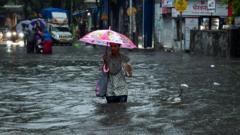A recent analysis highlights a critical imbalance in the availability and need for blood supplies linked to climate change-related disasters.
**Climate Change Threatens Global Blood Supply**

**Climate Change Threatens Global Blood Supply**
Extreme weather events due to climate change are jeopardizing both blood donations and transfusion demand, new study reveals.
Climate change is emerging as an unexpected foe to global blood supplies, according to a new study published in The Lancet Planetary Health. The analysis reveals that the increasing frequency of extreme weather events can significantly hinder blood donations while simultaneously escalating the demand for transfusions.
Lead author Elvina Viennet, an infectious disease researcher at the University of the Sunshine Coast in Australia, emphasizes the life-threatening implications of such disruptions. “Any major disruptions to the availability and safety of the blood supply puts lives at risk,” she stated, marking this as the first comprehensive global assessment of climate change’s impact on blood supplies.
The researchers conducted a thorough review of numerous studies that examine how escalating extreme weather—hurricanes, floods, heatwaves, wildfires, and snowstorms—affects public health, including mental and physical well-being, the transmission of infectious diseases, and the safety of blood transfusions. This review established connections between these findings and the entire blood supply chain.
As these weather events intensify, potential blood donors may find themselves unable to contribute due to unsafe conditions or called to address more pressing local emergencies. Moreover, mobile blood donation units might not be able to reach areas in need when disasters strike, exacerbating the situation even further.
In summary, climate change is causing not just environmental challenges but also posing significant risks to health systems around the world. Ensuring a suitable and safe blood supply during these tumultuous times may require innovative strategies in response to the growing impacts of climate fluctuations.
Lead author Elvina Viennet, an infectious disease researcher at the University of the Sunshine Coast in Australia, emphasizes the life-threatening implications of such disruptions. “Any major disruptions to the availability and safety of the blood supply puts lives at risk,” she stated, marking this as the first comprehensive global assessment of climate change’s impact on blood supplies.
The researchers conducted a thorough review of numerous studies that examine how escalating extreme weather—hurricanes, floods, heatwaves, wildfires, and snowstorms—affects public health, including mental and physical well-being, the transmission of infectious diseases, and the safety of blood transfusions. This review established connections between these findings and the entire blood supply chain.
As these weather events intensify, potential blood donors may find themselves unable to contribute due to unsafe conditions or called to address more pressing local emergencies. Moreover, mobile blood donation units might not be able to reach areas in need when disasters strike, exacerbating the situation even further.
In summary, climate change is causing not just environmental challenges but also posing significant risks to health systems around the world. Ensuring a suitable and safe blood supply during these tumultuous times may require innovative strategies in response to the growing impacts of climate fluctuations.




















